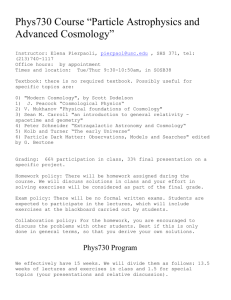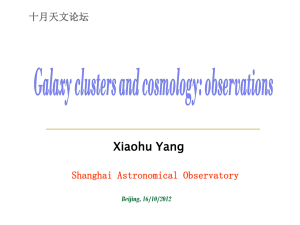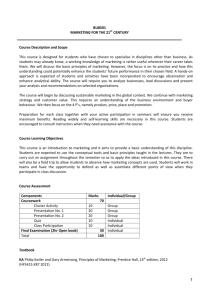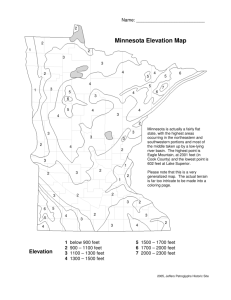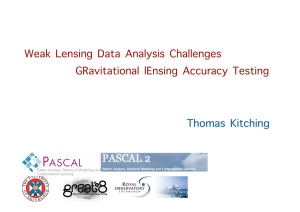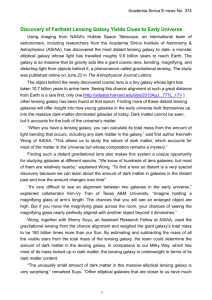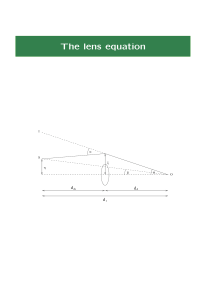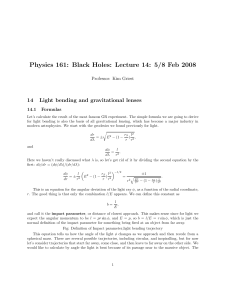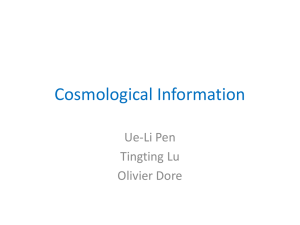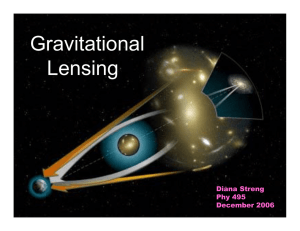Dark Matter
advertisement
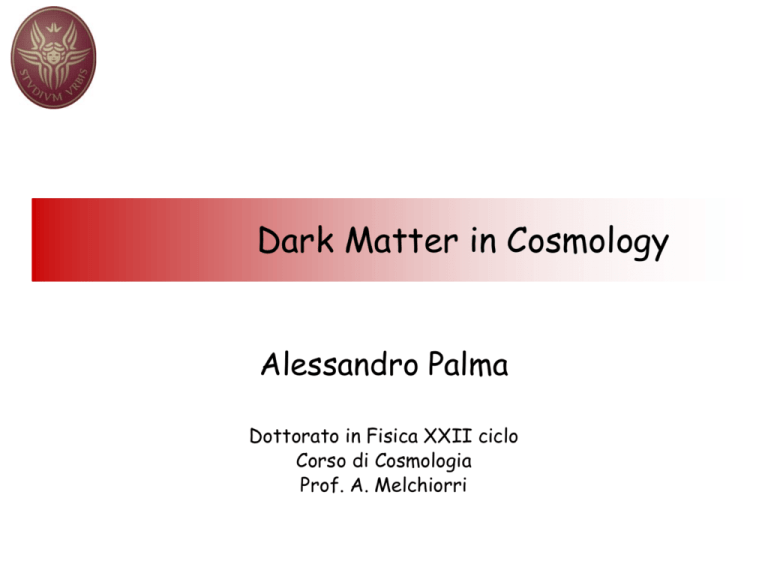
Dark Matter in Cosmology Alessandro Palma Dottorato in Fisica XXII ciclo Corso di Cosmologia Prof. A. Melchiorri Outlook ● Why does Cosmology need Dark Matter (DM)? – gravitational data from Galaxies and Clusters – structure formation in the Universe – lensing ● DM: observed relic density ● “Identity card” of DM particles ● DM candidates in particle physics ● Search for DM: experimental results of the DAMA experiment 2 Need for DM: galactic rotation curves (1) Newton says: 3 Need for DM: galactic rotation curves (2) ● Two possible explanations for the constant v at large R: – Newton’s wrong: Modified Newtonian Dynamics (MOND) – there is some Dark Matter, with r(r)~1/r2 to yield M(r) ~ r, which extends well beyond the luminous disk of the Galaxy ● Open questions with the Dark Matter solution: – we don’t know the dimensions of typical dark halos – DM density must fall off at a certain point, to keep the Galaxy mass finite 4 Need for DM: cluster mass ● First Zwicky, with Coma cluster (1938) ● The mass of the cluster obtained using virial theorem is MUCH more than what is obtained counting for the stars + the intergalactic matter gas (visible in X band) Coma cluster Visible X-rays 5 Need for DM: structure formation (1) ● Suppose no DM: structure formation arises from evolution of density inhomogeneities of baryonic matter ● Baryions are strongly coupled to photons in an equilibrium plasma until z ~1100 : no perturbation evolution for z >1100 ● From z = 1100, perturbation size increases of a factor ~103 ● This does not allow to observe nowadays structures ! 6 Need for DM: structure formation (2) ● Suppose DM: if DM freeze-out occurs early enough, i.e. zrm ~ 3570, DM perturbations can evolve from that time ● When baryions decouple at z ~ 1100, they can settle in DM potential minima (DM structures partly formed at z = 1100) ● “Leap” in baryon perturbation history, it’s like starting at z = 3570 instead of 1100 7 Need for DM: lensing (1) ● ● ● Huge masses curve space and bend photons (Einstein’s GR) This produces arcs, rings and distorted images of faraway cosmic objects Deflection angle a depends on impact parameter b of the photon wrt bending mass M 8 Need for DM: lensing (2) • Measure lensing patterns generated on “background” galaxies by clusters • Infer the mass of the bending cluster 9 DM: observed relic density W “BENCHMARK MODEL” Wtot ~ 1 ( CMB power spectrum) Wmat ~ 0.3 ( clusters ) WL ~ 0.7 (1 – 0.3) Wi = ri /rc,0 Wbar,0 = 0.04 (from Big Bang Nucleosynthesis) W*,0 = 0.004 (from <luminosity> of Galaxy stars) WDM = Wmat - Wbar,0 – W*,0 ~ 0.26 missing 10 “Identity card” of DM particles ● What is “Dark”? Not luminous, not absorbing: no EM interaction ● Stable, neutral ● ● Must give the correct relic density (WDMh) calculated today MACHO’s (MAssive Compact Halo Objects) or diffuse matter? – – ● dark halo can contain dark compact objects, i.e. brown dwarves, neutron stars, black holes… measures of lensing: our Galaxy’s dark halo is mostly (80%) diffuse Hot or cold? [hot (cold) means m>> (<<) kBT at freeze-out] – Structure formation requests Cold Dark Matter! 11 DM candidates in particle physics ● Primordial black holes formed before BBN ● Axions from CP-violating term in QCD Lagrangian (mass in meV range) ● WIMP’s (Weakly Interacting Massive Particles) with mass between 10 GeV and a few TeV and weak-scale couplings – heavy neutrino, but… LEP implies Mn > MZ/2 and this yields too low a relic density – LSP: sneutrino but… has large annihilation x-section and is ok only if very heavy (> several 100 GeV) uncomfortable for SUSY – LSP: neutralino …GOOD CANDIDATE! 12 Results of the DAMA/NaI experiment ● Observable: 1-year periodicity of DM flux due to combination of Sun+Earth velocity wrt to galactic halo (vsun ≈ 220 km/s) ● 6.3 s modulation signal detected in a 100-kg radiopure NaI detector+PM’s @ LNGS (7yrs of data taking until 2002) 13 References ● B. Ryden, “Introduction to Cosmology”, Addison Wesley (2003) ● [PDG2006] W.-M. Yao et al., J. Phys. G 33, 1 (2006) ● R. Bernabei et al., “Dark Matter search”, Riv. N. Cim. 26 n.1 (2003) 1-73 14
